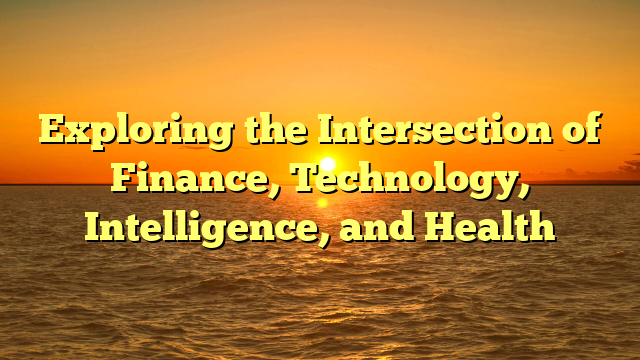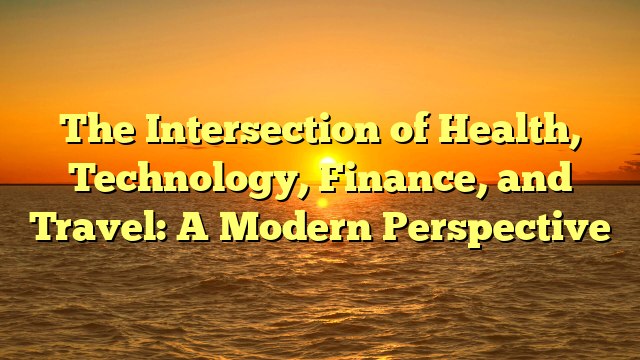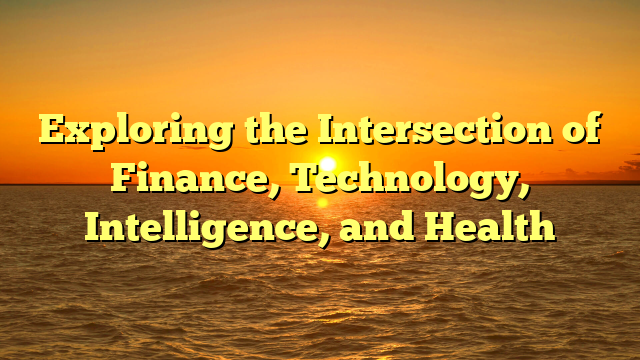In the modern era, the convergence of finance, technology, intelligence, and health is driving profound changes across the globe. Each sector influences the others, fostering innovation and providing solutions to pressing global challenges. This article delves into how these fields are interconnected and how they will evolve in the coming years.
1. The Impact of Finance on Global Development
Finance is the lifeblood of economic growth and stability. It encompasses everything from personal banking and investments to corporate financing and government spending. Over the years, the financial industry has undergone tremendous changes, driven by technological advancements and changing consumer behavior. The rise of digital payments, cryptocurrencies, and mobile banking is revolutionizing how we handle money. Furthermore, the global financial system is more interconnected than ever, with investments flowing across borders and impacting economies worldwide.
In the future, finance will continue to be a driving force behind innovation. The availability of capital for emerging sectors such as green energy, biotech, and artificial intelligence will open up new economic opportunities. However, new challenges such as digital currency regulation, the rise of fintech companies, and financial inequality must be addressed for a fairer financial future. Policymakers must work alongside financial institutions to create regulations that foster innovation while protecting consumers.
2. The Role of Technology in Shaping Our Future
Technology has become an integral part of modern life. With advancements in artificial intelligence, machine learning, blockchain, and virtual reality, technology continues to change the way we live, work, and communicate. The digital transformation is disrupting industries and pushing companies to innovate and adapt. While technology brings numerous benefits, it also presents challenges, including ethical dilemmas, data privacy concerns, and the potential for widening the digital divide.
The intersection of technology and healthcare is creating groundbreaking changes in the way we monitor and manage our health. Innovations like telemedicine, AI-powered diagnostics, and personalized medicine are transforming healthcare delivery. With the advent of AI and big data, health professionals can offer more precise treatments, leading to better outcomes for patients worldwide.
3. The Rise of Artificial Intelligence and Intelligence Systems
Artificial intelligence is becoming an essential tool in numerous industries, offering solutions to complex problems and enhancing productivity. In healthcare, AI is used to predict patient outcomes, identify new drug therapies, and automate administrative tasks. In finance, AI is transforming how investment decisions are made, helping analysts predict trends and optimize portfolios. As Bayar4D Alternatif continues to evolve, its applications will expand further, potentially reshaping the job market, economy, and society as a whole.
However, the rise of AI also raises ethical concerns. As AI systems become more sophisticated, there are concerns about privacy, job displacement, and the potential for biased decision-making. Ensuring that AI technologies are developed and implemented responsibly will be crucial for maximizing their benefits while minimizing negative impacts. Furthermore, the increasing reliance on AI could raise questions about human autonomy and control over decision-making.
4. Health and Well-being in the Digital Age
The role of technology in healthcare is growing rapidly, particularly in the realm of preventative care. Wearables like smartwatches and fitness trackers enable users to track vital statistics such as heart rate, sleep patterns, and physical activity. Additionally, telemedicine has made healthcare more accessible by allowing patients to consult with doctors remotely. As technology continues to evolve, we can expect even more innovative solutions that enhance our well-being and improve health outcomes worldwide.
As technology continues to advance, healthcare delivery will become more efficient and equitable. Innovations such as telemedicine and digital health services are breaking down geographical and financial barriers to healthcare, making essential services more accessible to people in remote areas or underserved communities. This transformation promises to improve health outcomes and promote a more inclusive global healthcare system.
Conclusion
The convergence of finance, technology, intelligence, and health presents exciting opportunities for global development. These fields are intricately connected, with advancements in one often driving progress in others. As we look toward the future, it is clear that these sectors will continue to evolve, creating new challenges and opportunities. By harnessing the power of innovation, we can build a more connected, equitable, and healthy world for generations to come.
Exploring the Intersection of Finance, Technology, Intelligence, and Health


